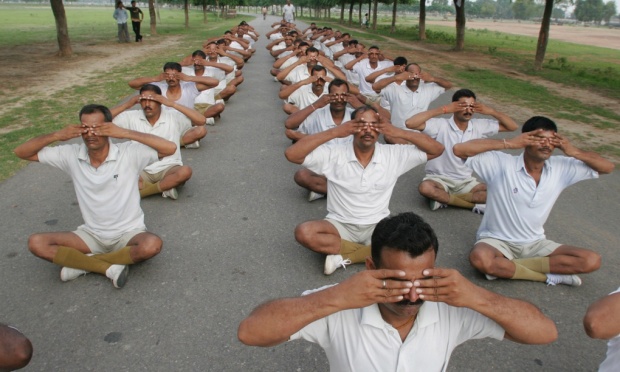An Indian police chief has adopted a tranquil approach to improve behaviour among his ranks: meditation.
District commissioner Hasmukh Patel is so convinced of the benefits he has introduced the option for his staff to take the time to train in the art with full pay and allowances. Daily yoga is also strongly encouraged.
Patel is responsible for 3,500 officers across six districts in the south of Gujarat – 175 of whom have taken up the offer so far.
How does he drum up interest? They come to him. It only works if it’s a personal choice, “one cannot be forced”, Patel explains from his Surat office, decorated with certificates of meditation excellence.
He reels off examples of how meditation has been useful. The officer whose daughter used to avoid him when she was doing her homework, and now won’t do it without him. The classic bad-cop-turned-good story: a man notorious for extortion who changed his ways. It worked for him too: “As a police officer I deal with injustice. I used to get angry but after meditation I didn’t.”
Vipassana is the chosen school: an ancient technique originating from India which means “to see things as they really are”. According to official literature it was rediscovered by Gautama Buddha more than 2,500 years ago and taught as an art of living, aiming “for the total eradication of mental impurities and the resultant highest happiness of full liberation.” A healthy connection between mind and body is the ultimate goal which is taught through a 10-day intensive, silent course.
The examples given seem to infer a level of violence or anger among his officers. Is that what he is hoping to address? It is about people’s reactions, he explains: “Of course, violence is also a form of reaction. It is an extreme form of reaction. The incidents of violence committed by Indian police reported in the media are exceptions but of course the Indian police need to learn to improve their behaviour with the community. Vipassana helps in that.”
Yoga, which many regard as an extension of meditation focusing on the body, is also popular among the force. Almost 500 of his officers practice every day and many have become teachers for their peers. Sometimes it needs a little encouragement: “Introducing and sustaining such new ideas like yoga requires leadership efforts. I have to motivate them time and again.”
Police inspector Aniruddh Captain says that Patel introduced him to the idea during a seminar on youth justice. Patel has taken the meditation course and now does yoga five times a week. The 39-year-old has shed a few pounds and feels more flexible, but what about the cognitive benefits? “The energy level remains steady and it helps to control anger. If there is a heavy work load of work I become angry but after doing yoga and meditation I can control my anger.”
Advertisement
Patel is also trying to change the way his policemen respond to incidents. He describes a recent case where a group of his officers were attacked – one so badly that he is still in hospital. Instead of the familiar heavy-handed response Patel used it as an opportunity to open a dialogue with the community to discuss how they can work better together. He shows off a text from a local journalist praising him for such a refreshing approach. What about the officer’s family? They are on board too, he insists.
Has it had an effect on crime figures? “No” says Patel cheerfully, in fact crime figures have risen 100% across his district in past three years. “We should not be worried about a falling crime rate. It is our job to represent the people.” He says that focusing on figures is futile – pointing to a tendency to massage statistics – and is rueful about a culture of apathy when dealing with reported crimes. “When that happens people feel ignored, they lose trust,” he adds.
What do the public think? Patel admits there has not been a systematic study on the benefits, but he has collected informal anecdotes from police colleagues, family and a few members of the public. When asked about any noticeable changes “the main impact is reduction in reaction, anger, fear and improvement in concentration, better and focused decisions”.
Transparency International ranks India as one of the world’s most corrupt countries, scored by perceived level of corruption among public institutions, which includes the police.
In 2011 the I Paid a Bribe website launched in India as a platform to report corruption. In less than a year more than 10,000 bribes across 347 cities had been reported. The site also includes an option to nominate those who are setting a good example, provide tips of navigating paying a bribe and the key facts about the police that everyone should know.
Yoga and India are synonymous. The discipline has been practiced in Asia for over 2,000 years, but only became a global phenomenon in the last two decades. BKS Iyengar, the guru who is widely credited with igniting interest in the west, started his school Pune, a city in Patel’s neighbouring state of Maharashtra.
Police doing yoga is not a new thing either. In Punjab and in parts of Nepal police officers have been encouraged to take classes to lose weight, but for Patel it’s all about the holistic benefits. “It is a wonderful thing” he says, and offers to take the Guardian class.
From: The Guardian

